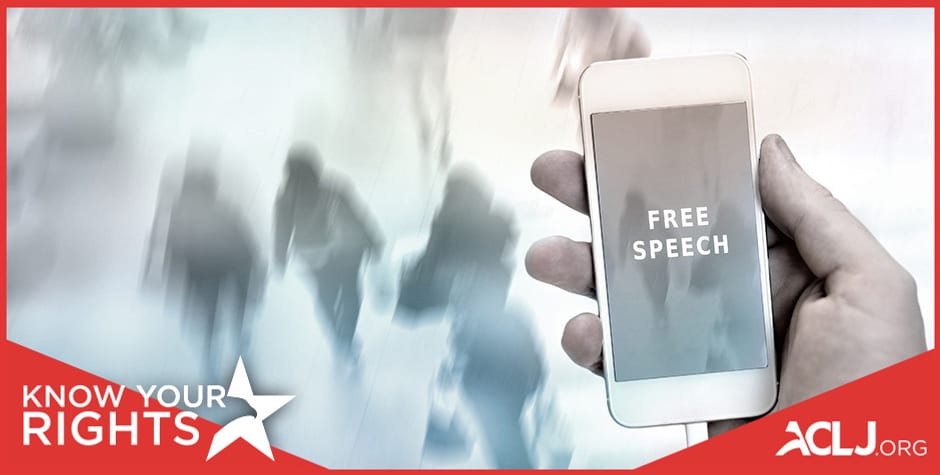Know Your Rights: First Amendment Free Speech Protections Apply to Government Employees
The last several years, most of us have heard the expression, “the speech police.” This expression is often tied to various social media platforms and those who seek to shut down the speech of those with whom they disagree. Familiar tactics of the “speech police” often include attacking folks who present counter viewpoints. The “speech police” often target those who support specific policies, including, for example, protecting the rights of the unborn. The “speech police” also fought to discredit those who merely questioned the origin of COVID.
The “speech police” seem to have penetrated the Biden Administration as well. The ACLJ is keenly aware of this problem and the way in which the “speech police” target those with whom they disagree (see here, for example). Because these unfortunate tactics are on the rise, the ACLJ recently wrote a legal memorandum that explains the First Amendment speech rights of government employees (those employed by federal, state, or local government). We also briefly examine the way in which certain states may offer speech protection to private sector employees.
As we discuss in our memo, First Amendment free speech protections for an employee depend primarily on whether the employee works in the public or private sector. The First Amendment, for example, provides free speech protections for those who work in the public sector (but not for those who work in the private sector). As we point out in our memo, “the right of free speech includes not only the affirmative right to speak, but also the right to be free from retaliation by a public official for the exercise of that right.” In other words, “government employees do not forfeit their constitutional rights at work . . . .”
Government employees do, however, accept some restrictions on their freedom of speech because they work for a government entity. As our memo explains, a government employer maintains the right to restrict an employee’s speech when the speech is “pursuant to his duties.” The Supreme Court has said that, when pursuant to his (or her) duties, “the Free Speech Clause generally will not shield the individual from an employer’s control and discipline because that kind of speech is—for constitutional purposes at least—the government’s own speech.”
In contrast to government speech pursuant to one’s official duties, “when an employee ‘speaks as a citizen addressing a matter of public concern’ . . . the First Amendment may be implicated and courts should proceed to a second step.” At this second step, as our memo notes, courts “have sometimes considered whether an employee’s speech interests are outweighed by the interest of the State, as an employer, in promoting the efficiency of the public services it performs through its employees.” As we point out, this analysis is framed in terms of whether the employer’s interest gives “adequate justification for” the restriction of the employee’s speech, conditioned on the fact that “the restrictions [the government employer] imposes must be directed at speech that has some potential to affect the entity’s operations.”
Political discrimination of government employees is another important topic our memo addresses. In our memo, we explain that the First Amendment provides public sector employees protection against retaliation for the exercise of constitutional rights, including the free expression of political views and beliefs. In Heffernan v. City of Paterson, as referenced in our memo, the Supreme Court stated that “[w]hen an employer demotes an employee out of a desire to prevent the employee from engaging in political activity that the First Amendment protects, the employee is entitled to challenge that unlawful action . . . .” In fact, we recently won a case where a government employer had fired someone for having political bumper stickers on their vehicle. This was a clear example of the First Amendment’s protections for a public employee’s free speech.
Our memo concludes with a brief discussion on the speech rights (or lack thereof) of private sector employees. Here, we point out that even though First Amendment free speech protections do not apply to private sector employees, some states provide speech protection to private sector employees in other ways. Connecticut, for example, offers broad statutory protection for private sector employees’ speech. North Dakota and New Mexico both offer some free speech protection for private sector employees as well.
It must also be noted that Title VII of the Civil Rights Act of 1964 prohibits most employers who have at least 15 employees from, among other things, discriminating in employment based on religion. Per the EEOC, for example, “Title VII requires that employers accommodate an employee’s sincerely held religious belief in engaging in religious expression in the workplace to the extent that they can do so without undue hardship on the operation of the business.” We discuss your religious liberty rights at work in more detail here.
In sum, government employees must not be discriminated against for exercising their First Amendment free speech rights. Hopefully, this blog and corresponding memo will prove helpful to you or someone you know. The ACLJ is dedicated to defending your constitutional rights. We have been providing assistance and legal representation, at no cost or charge, to people just like you for decades. If your rights are being violated in this area, please contact us at ACLJ.org/HELP.
Learn more about your constitutional rights at ACLJ.org/Know-Your-Rights.
